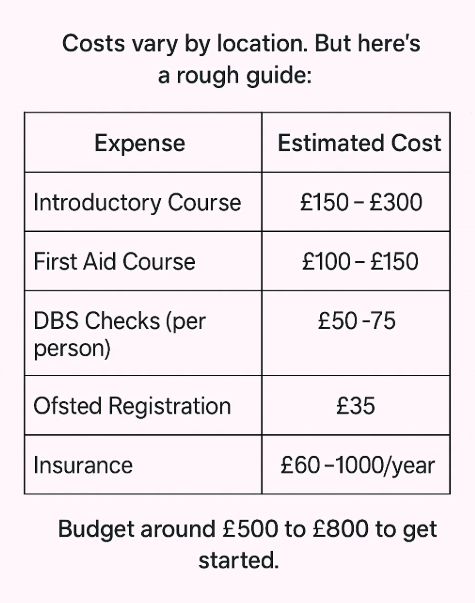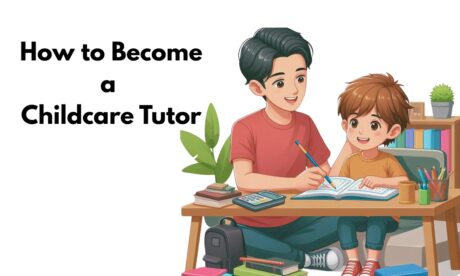You’re already great with children. Now it’s time to turn that into a qualification and a career. Here’s how you can officially become a professional childminder—and make a real difference.
If you want to know how to become a qualified childminder in the UK, this is the place to start. I’m going to walk you through every step. No jargon. No confusion. Just clear, simple advice that works.
Childminding can give you freedom, purpose, and a reliable income. If you love working with children, why not turn that natural gift into something bigger? Let’s get started.
What Is a Childminder? A Quick Look at the Role
A childminder looks after children in their own home. It’s not the same as working in a nursery or school. You run your own business and set your own hours. You welcome children into a safe, happy space where they can learn and grow.
Childminders work with babies, toddlers, and school-aged children. Every day is different. Some days you’ll be finger-painting. Other days you’ll be wiping muddy boots and baking fairy cakes. You help children develop through play, learning, and social time.
Why Become a Qualified Childminder? The Real Benefits
You already know you enjoy working with kids. But why go one step further and become qualified?
Here’s why:
- Can earn a steady income.
- Control your hours and holidays.
- Build a small business that fits around your life.
- Make a positive impact on young lives.
Ofsted only registers childminders who are qualified. Parents trust Ofsted-approved professionals. It shows you meet the standards for childcare in the UK. Without this step, you won’t get insured or paid legally.
How to Become a Qualified Childminder: The Full Process
Here’s the big answer to the question how to become a qualified childminder. Follow these steps in order. No skipping ahead!
1. Check If Childminding Fits Your Life
Before you dive in, check if this suits your lifestyle. Childminding means opening your home to children. You’ll need patience, energy, and strong organisational skills.
Ask yourself:
- Do I love spending long days with little ones?
- Am I happy to keep learning new things?
- Can I run my own business from home?
If yes, keep going.
2. Complete a Childminder Introduction Course
This course shows you what’s involved. It covers the basics of childcare and running a small business. Local councils offer these courses. Some private companies do too.
These courses help you decide if this is really right for you. They also prepare you for the registration process.
3. Get a Paediatric First Aid Qualification
You must complete a paediatric first aid course. It should last at least 12 hours and be approved by recognised bodies. This gives you the skills to handle accidents and emergencies confidently.
It’s not just about ticking a box. It’s about keeping children safe.
4. Pass a DBS Check
Every childminder needs a Disclosure and Barring Service (DBS) check. This shows you have no criminal record that would prevent you from working with children.
Everyone in your home aged 16+ also needs one. Safety first.
5. Register with Ofsted or a Childminder Agency
Most childminders register with Ofsted. Some prefer a childminder agency. Agencies often offer more support, but you’ll pay fees.
Ofsted sets the legal standards. They will visit your home and check:
- Safety of your space
- Quality of your learning activities
- Health and hygiene standards
If you pass, you’re officially registered.
6. Sort Your Insurance and Business Setup
You need public liability insurance. This protects you and the families you work with.
You’ll also need:
- Business bank account
- Simple bookkeeping system
- Contracts for parents
You are now a small business owner. This is your career, not a hobby.
7. Set Up Your Home for Childminding
Your home must meet safety standards. This doesn’t mean it needs to look like a nursery. It just needs to be clean, safe, and welcoming.
Think stair gates, fire safety checks, secure gardens, and locked cupboards for cleaning products.
Create spaces for:
- Play and learning
- Eating meals
- Rest and sleep
Think practical, not perfect.
8. Plan Your Early Years Foundation Stage (EYFS) Learning
Ofsted expects you to follow the EYFS framework. This means planning activities that help children learn through play.
You don’t need to be a teacher. Just offer activities that support:
- Language and communication
- Physical development
- Social skills
- Early maths and literacy
Think playdough, story time, songs, puzzles, and nature walks.
Key Skills for Childminders That Go Beyond Paperwork
Qualifications get you through the door. Your skills keep you there.
You need:
- Patience
- Creativity
- Strong communication
- Organisation
- A calm attitude in chaos
Children notice when adults care. Parents trust childminders who are reliable and warm. These soft skills matter as much as any certificate.
How Long Does It Take to Become a Qualified Childminder?
It depends how fast you work through the steps. Most people take between 3-6 months.
Some parts are quick, like your first aid course. Other steps, like Ofsted registration, take longer.
Don’t rush it. You want to start your career on solid ground.
How Much Does It Cost to Qualify as a Childminder?

How Much Can You Earn as a Childminder in the UK?
Your income depends on location, hours, and demand.
Average UK childminders charge between £5 to £8 per hour, per child.
If you care for 3 children, 5 days a week, your income can reach £30,000+ per year.
This career lets you build earnings around your family and lifestyle.
Common Mistakes to Avoid When Starting as a Childminder
Skipping research. Understand the rules before you commit.
Rushing setup. Safe spaces and planning take time.
Ignoring paperwork. Keep records clear and up-to-date.
Undercharging. Know your local market and value your work.
Burning out. Set clear working hours. Rest is part of success.
Tips for Building a Thriving Childminding Business
Network with others. Join childminding groups online and locally.
Stay on top of training. Keep learning about childcare and business.
Offer something special. Forest school style? Healthy eating? Music sessions? Stand out.
Communicate clearly with parents. Good relationships bring repeat business and referrals.
What Happens After You Become Qualified?
Once you’re qualified, your real work begins.
You’ll keep records of learning and development for each child and communicate with parents regularly. You’ll prepare for inspections every few years.
Stay positive and keep improving. The best childminders never stop learning.
Final Thoughts: Turning Your Gift with Children Into a Career
You’ve got the passion. Now you’ve got the steps. Becoming a qualified childminder isn’t complicated—but it takes commitment.
If you want to know how to become a qualified childminder, here’s the truth: You already have the most important skill. You care.
Qualifications turn your care into a career. They show parents and Ofsted you’re serious, safe, and ready.
This path gives you freedom, pride, and purpose. Start today. Your future business—and those happy little faces—are waiting.
If you’d like, I can also help you write a downloadable checklist or guide based on this blog. Just let me know!
Ready to take the next step? Enrol in our Child Care courses at Unified Course and start your journey towards becoming a professional childminder!




